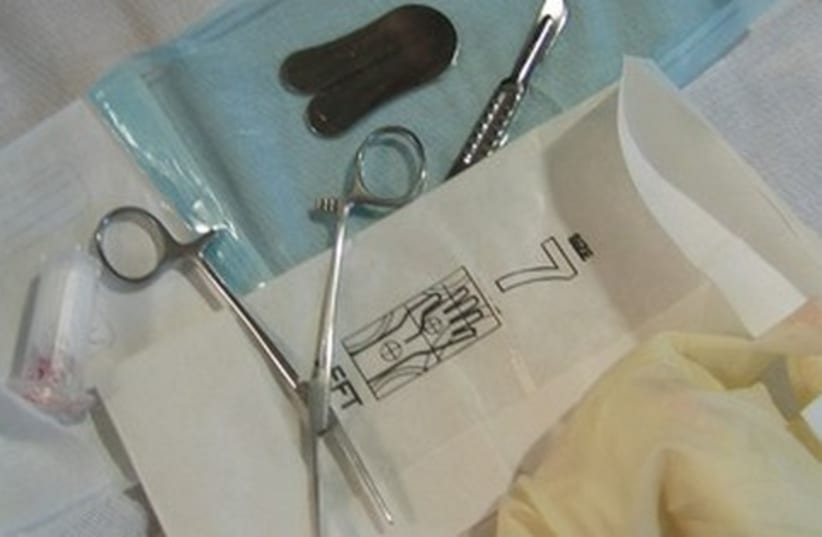When it comes to COVID-19, things have already become pretty lax here in Israel. It’s true that the government just eased some restrictions, which was very welcome after the two nights of total lockdown over Passover.
However, much to my dismay, the easing appears to have started well before any official announcement. In fact, as early as last week, it wasn’t hard to find families playing in parks and schoolyards, when we weren’t meant to go any farther than 100 yards from our house unless absolutely necessary. For those of us following the government’s directives, this was hard to witness.
Knowing this, I should not have been shocked to hear the sounds of a minyan (prayer quorum) this past Shabbat on my way to perform a brit milah (circumcision). At that time, prior to the easing of the restrictions, it was illegal to pray as a community – a reality none of us ever thought possible in the Jewish homeland. But like people in most other countries, we have to separate to slow the spread of the virus.
In an alternate universe where this virus has never existed, I would have smiled upon hearing Jews keeping God’s commandments, but not this time. The sound infuriated me. I couldn’t help but think, “Don’t these people know they’re ruining it for all of us? All of our hard work is being thrown away.” I couldn’t imagine anything more selfish than this.
When I arrived at the family’s home for the brit milah, the father remarked that there was an illegal minyan next door. It probably frustrated him as well, and rightfully so. His son’s bris was about to take place with fewer adults than were praying next door.
One of our happiest occasions, usually attended by every family member and friend who can make it, was being held with just six adults, all donning protective masks.
My heart ached at how lonely it felt, cramped into the parents’ small apartment, with the grandparents banished to the porch for safety.
But then I heard it. People were singing joyous songs outside. At first I thought, “What are the odds that another family has a special occasion so close by, in the era of coronavirus?” The father turned to me as if he knew what I was thinking and said, “Those are our neighbors. They’re singing for us.”
I was overwhelmed. The melodies of fellow Jews singing in unison rose up and surrounded us throughout the whole ceremony. The father eagerly ran out to the porch and announced the baby’s name for those who were too remote to hear its first proclamation.
In one fell swoop, I went from being wholly despondent at the state of our great nation to being completely certain that we will defeat this disease. It was an emotional moment, and I was thankful to be part of it. However, I’d be remiss not to point out that we’re far from in the clear. I do believe that humanity will win in this viral war, but we’ve still got a long way to go.
WHAT WE must all keep in mind is that all of the social distancing is not intended to protect each of us individually. The great majority of us might contract the virus at one point or another. But our duty is to our neighbors. These restrictions are meant to protect the most vulnerable among us; those at high risk who, if infected, will be most susceptible to the worst-case scenario. We wear masks and keep our distance to save as many elderly and infirmed people as possible. I can’t think of anything more Jewish than that.
When I spent my first year learning in a yeshiva, we studied a classic section of the Talmud, Tractate Bava Batra. Hour after hour I pored over pages dealing with topics such as who is responsible to pay for a fence between two privately owned properties. That is, if one neighbor desires privacy from the other and wants a fence erected between the two areas, then both owners split the cost of the fence.
This was not the most spiritual uplifting topic for one’s first deep dive into Jewish text.
That was, until the final speech of the year by the rosh yeshiva.
The head of our school outlined the underpinnings of the year’s learning: In places like America, the legal focus is on “my rights.” If Bava Batra had been written in modern America, it would list a person’s ability to build a fence on his property with his own money and how his neighbor couldn’t stop him.
But those are not Jewish values. Our responsibility is to the other; what can or must I do for him or her. Therefore, both property owners must split the cost of the fence, even though only one party desires it.
The same applies to our current situation with coronavirus restrictions. Our duty is not to ourselves. It’s not about what I want, whether it be playing in the schoolyard or praying in a minyan. Our responsibility is to our fellow neighbors; to those who may be more susceptible to COVID-19 than we are.
If we have to keep our special occasions to a bare minimum, then so be it. All we can hope for is that our neighbors will come to their balconies and lift our spirits, just a little bit, with songs of praise.
The writer is a Jerusalem-based mohel who performs circumcisions all over the world, and the founder of Magen HaBrit, an organization protecting both brit milah and the children who undergo it.
